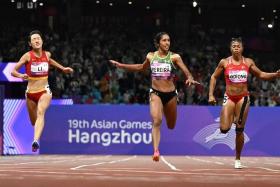Asian Games: M'sian wushu gold medalist fails dope test, stripped of title
Asian Games organisers on Tuesday expelled Malaysia’s wushu gold medal-winner Tai Cheau Xuen after she failed a drug test, becoming the tournament’s third doping case.
Tai, 24, was tested after winning the Chinese martial art’s women’s nanquan and nandao all-round event on September 20, Malaysia’s first gold medal of the Games.
She was found to have taken the stimulant sibutramine, the Olympic Council of Asia (OCA) said in a statement.
“The competitor has been disqualified from the competition as well as these Games, and as such her accreditation cancelled and her medal withdrawn,” said the statement.

The official announcement of the failed test was delayed because Tai and the Malaysian Olympic Committee had asked for the B-sample to be examined, officials said.
A Tajik footballer, Khurshed Beknazarov, and a Cambodian soft tennis player have already been expelled for failing tests.
Nineteen-year-old Cambodia Yi Sophany was also found to have taken sibutramine, which is widely used as a dietary supplement to control weight.
About 1,900 doping tests will be carried out on the Asian Games athletes, according to the OCA medical committee chairman M. Jegathesan. The Games involves 9,500 athletes from across the region.

Indonesia's Juwita Niza Wasni (L) will now take the gold, while China's Wei Hong (R) will get a silver. Photo: AFP
Tai's disqualification means that Indonesia's silver medalist Juwita Niza Wasni (L) will now take the gold, while China's Wei Hong will get a silver. Fourth-placed Ivana Ardelia Irmanto, also Indonesia, now finds herself with a bronze.
According to Jegathesan, there are three kinds of doping failures:
- The “hard-core” cheats who deliberately take the “magic pill” because they think it will help them to win.
- The competitors who are pushed into doping by their coaches.
- Athletes who get caught through “ignorance” just by taking medicines and diet treatments.
The Cambodian athlete told the OCA that she had taken sibutramine as part of a beauty treatment, officials said. And they acknowledged that it probably would not have helped her performance.
But the OCA is obliged to follow the World Anti- Doping Agency rules and list of banned stimulants.
Jegathesan said that neither of the first two cases reported were probably intentional.
“I don’t think there was ever any intention to use these to cheat.” - Medical committee chairman M. Jegathesan
“But we cannot make an exception to the rule simply because we are sympathetic. We have a job to do, to protect the clean athlete,” he added. - AFP
Get The New Paper on your phone with the free TNP app. Download from the Apple App Store or Google Play Store now


